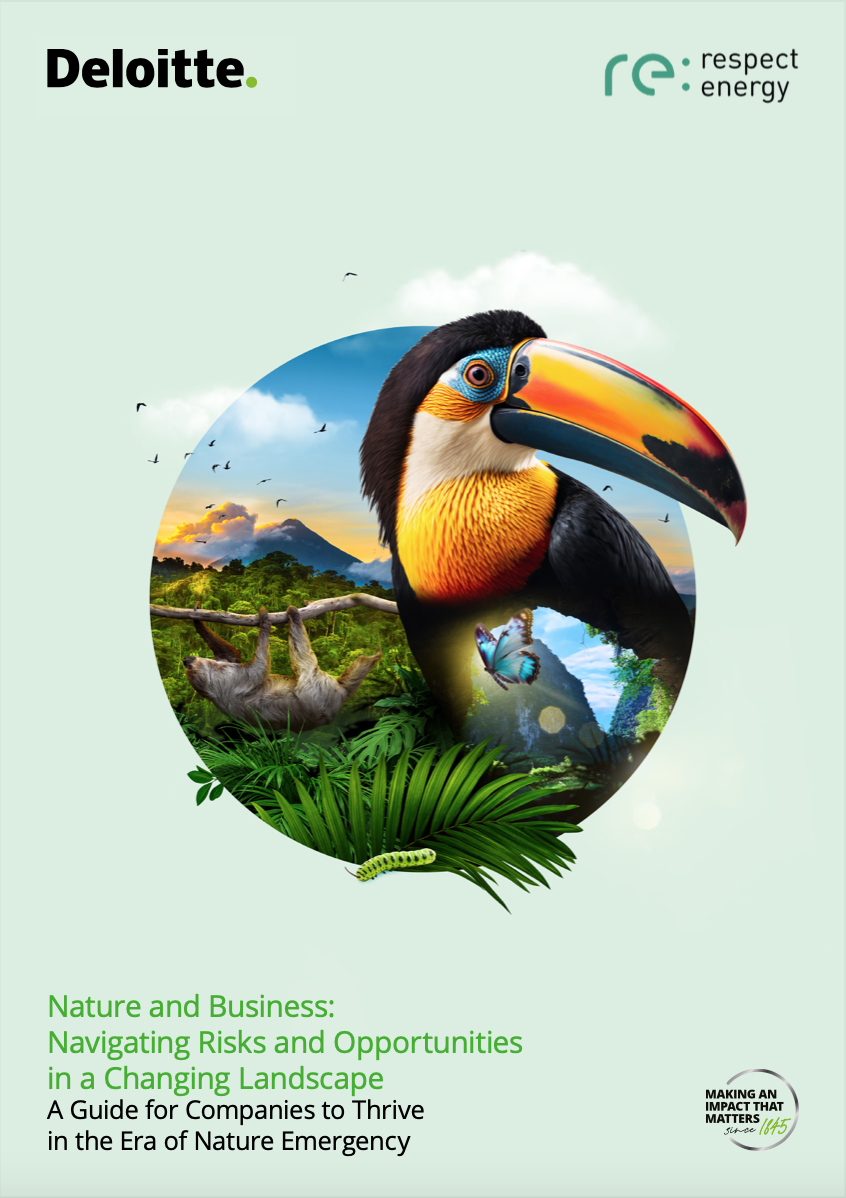The decline in biodiversity, one of the consequences of a resource-intensive economy, is now considered one of the greatest threats to humanity. The loss of submerged forests alone could cost the global economy as much as $500 billion annually, according to the report “Nature and Business: Navigating Risks and Opportunities in a Changing Landscape,” prepared by consulting firm Deloitte, at the initiative of the publication’s partner Respect Energy. Despite the scale of the threat, companies’ awareness of the need to take decisive action is low. However, this may change as a result of the increasing materialization of climate and environmental risks, as well as growing pressure from regulators and stakeholders.
Based on surveys and interviews, with representatives of more than 90 companies representing nearly 11 different sectors, experts from Deloitte and Respect Energy have compiled a report analyzing the environmental impact of companies, with a particular focus on biodiversity. The publication is a unique tool for engaging in a substantive discussion of the importance of biodiversity issues to the global economy and what steps need to be taken to effectively and efficiently protect the environment.

Nature vs. economy
According to the report, there are five factors responsible for the 90% of natural diversity loss cases during the last 50 years. These are the transformation of the terrestrial and marine environments, climate change, pollution, exploitation of natural resources and the spread of invasive species. Each of the areas mentioned not only affects the environment, but also a number of different economic sectors. One example given in the report is the relationship between sea otter populations and the condition of seaweed. These mammals help protect forests of underwater plants from the negative effects of sea urchins, which is crucial for many sectors (fishing, drug production, etc.). The total annual contribution of seaweed to the world economy is more than $500 billion.
– How heavily we as humanity depend on the environment and biodiversity is best demonstrated by the fact that more than half of the world’s GDP relies heavily on natural resources. Not surprisingly, the decline in plant, animal and insect species has been identified as one of the top ten challenges for humanity in the coming decade. The growing awareness of this issue will in turn have a significant impact on the health of the private sector. Already, environmental regulations are a factor that largely determines the operation of many industries – says Irena Pichola, Partner, Team Leader for Sustainable Development in Poland and Central Europe, Deloitte.
Biodiversity – an opportunity for companies
The current rate of species loss exceeds historical norms many times over. Economic growth and the resulting exploitation of biodiversity have led to the extinction of 82 percent of wild mammals (in terms of biomass) and almost half of natural ecosystems. As the report’s authors point out, paradoxically, a significant proportion of entrepreneurs are highly optimistic about environmental issues. Three out of four survey participants believe that immediate decisive action will make it possible to reduce the greatest consequences of biodiversity loss. At the same time, one in five of those surveyed believes that the point of no return has long since been passed and it is too late to repair said damage.
Regardless of the current state of ecosystems, businesses will feel significant pressure to take action to protect the climate in the coming years. Already, nearly 80 percent of companies acknowledge that they are experiencing pressure from various quarters to increase an entity’s commitment to biodiversity. The most common is pressure from the government (52 percent of responses), shareholders (43 percent), civil society (43 percent) and consumers (39 percent).
– It seems that while business is getting better at dealing with climate issues, biodiversity remains a foreign issue for companies. However, it is worth remembering that the two areas are inextricably linked. For example, in the EU taxonomy classifying investments, in addition to technical criteria, it is necessary to confirm that it does not do serious damage to the environment. Therefore, today’s entrepreneurs should keep in mind that environmental issues are becoming one of the key factors determining the possibility of development of the modern economy. This means that companies should systematically analyze the impact of their operations on the environment, including the issue of biodiversity. It may be helpful to adopt a structured framework for such analysis, using tools such as TNFD (Task Force on Nature-related Financial Disclosures) – says Sebastian Jabłoński, Chairman of the Board of the Respect Energy Group.
One of the biggest challenges faced by those wishing to engage more strongly in environmental protection is the issue of cost (31 percent of responses). Even more important are expectations from investors and shareholders in the area of short-term financial targets (41 percent). On the other hand, one in five the surveyed entrepreneurs point to the problem of obtaining grants and loans to enable greater commitment to biodiversity.
Despite a number of challenges awaiting companies, the study’s authors emphasize that companies’ commitment increasing to biodifferentiation can bring a number of benefits. These include not only long-term and hard-to-define issues such as the well-being of future generations, but also the opportunity to increase audience attention, attract new customers or obtain additional financing.
Knowledge first
The results of the survey show a diverse range of biodiversity initiatives introduced by companies. 63 percent of companies express openness to working with others to share knowledge and good practices related to biodiversity. 48 percent is in turn willing to work within its value chain, such as by involving its suppliers in particular initiatives. Four out of ten companies are considering public reporting on biodiversity efforts. At the same time, although two-thirds of respondents report moderate or high awareness of climate and biological risks, only one-third include biodiversity in their risk assessments. In addition, as much as 60 percent of companies do not collect biodiversity-related data, making it impossible to develop an appropriate environmental strategy. These findings suggest the need for increased efforts to integrate biodiversity into corporate strategies. Also significant are the issues of developing non-financial reporting and establishing comprehensive sustainability management structures to ensure a more robust response to emerging challenges.
Polish challenges
In the case of the Polish market, the survey results highlight the divergence from the average of other countries. While 63 percent of global respondents express openness to cooperation, the corresponding figure for the Polish market is 49 percent. The willingness of Polish entrepreneurs to engage in the value chain, on the other hand, is 8 pp lower compared to the rest of the markets. The different approach to public reporting of biodiversity efforts is even more pronounced (24 percent in the Polish market vs. 42 percent worldwide). The survey results indicate that the level of environmental awareness in Poland is slightly lower, at 56 percent. This discrepancy becomes more pronounced when it comes to the need to include biodiversity in risk assessments. While the global average is 33 percent, only one in five Polish companies include biodiversity in their risk assessments. These discrepancies may suggest that domestic companies are facing a challenge in catching up in the area of sustainability measures.
In the face of the biodiversity crisis, there is no doubt that cooperation and involvement of the widest possible range of stakeholders is necessary to respond to the global challenge of biodiversity conservation. For this reason, it is critical to build coalitions between the private sector, the public sector and NGOs.
– In the face of regulatory changes and the materialization of biodiversity risks, today’s companies must take action in a transparent and inclusive manner. Cooperation with the third sector is becoming crucial to effectively carry out our shared responsibility for environmental protection. Let’s not forget that the annual value of ecosystem services worldwide is estimated at $150 billion. The cost of losing them is and will be borne by everyone: governments, citizens, but most importantly, businesses – says Miroslaw Proppe, President of the WWF Poland Foundation.
The full downloadable report can be found here.
Source: Respect Energy Holding














